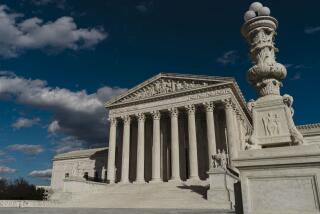Miranda rights and terror suspects
There was an uproar when it was revealed that Umar Farouk Abdulmutallab, the so-called Christmas Day bomber, was read his Miranda rights. The hysterical reaction obscured a real dilemma for law enforcement: how to obtain what could be vital information about terrorist plots without denying suspects their legal rights. Atty. Gen. Eric H. Holder Jr. and the FBI have produced guidelines that adroitly balance the two interests.
Issued Oct. 21 but made public only recently, the guidelines will not please those conservatives who insist that suspected terrorists shouldn’t be Mirandized at all. But they strike us as reasonable and, equally important, useful in heading off efforts in Congress to weaken Miranda.
The guidelines say that if applicable, “agents should ask any and all questions that are reasonably prompted by an immediate concern for the safety of the public or the arresting agents without advising the arrestee of his Miranda rights.” This advice is consistent with a 1984 Supreme Court decision making an exception from the Miranda requirement for questioning motivated by a concern for public safety.
Next, the guidelines say that after public safety concerns have been resolved, agents should promptly Mirandize a suspect. But there are exceptions: situations in which, “although all relevant public safety questions have been asked, agents nonetheless conclude that continued unwarned interrogation is necessary to collect valuable and timely intelligence not related to any immediate threat, and that the government’s interest in obtaining this intelligence outweighs the disadvantages of proceeding with unwarned interrogation.” This provision pushes the public safety exception to its limit, but it’s defensible.
Finally the guidelines remind agents that the Miranda rule is ultimately about ensuring that confessions introduced at trial are not coerced: “The Supreme Court has strongly suggested that an arrestee’s 5th Amendment right against self-incrimination is not violated at the time a statement is taken without Miranda warnings, but instead may be violated only if and when the government introduces an unwarned statement in a criminal proceeding against the defendant.” The point is that if an agent believes Mirandizing a suspected terrorist would lead to vital information being withheld, the agent can delay doing so — but at the cost of rendering the results of the interrogation inadmissible.
The new guidelines strike a reasonable balance between the needs of law enforcement and the rights of suspects. In fact, they’re so reasonable that they shouldn’t be limited to terrorism cases but should apply to any case — a gang-related case, say, or a murder plot — in which a suspect may have knowledge of a possible future threat. Singling out terrorism suspects as less deserving of legal protections than others is generally a bad idea. So let’s by all means implement the new guidelines, and broaden them beyond terrorism.
More to Read
A cure for the common opinion
Get thought-provoking perspectives with our weekly newsletter.
You may occasionally receive promotional content from the Los Angeles Times.










